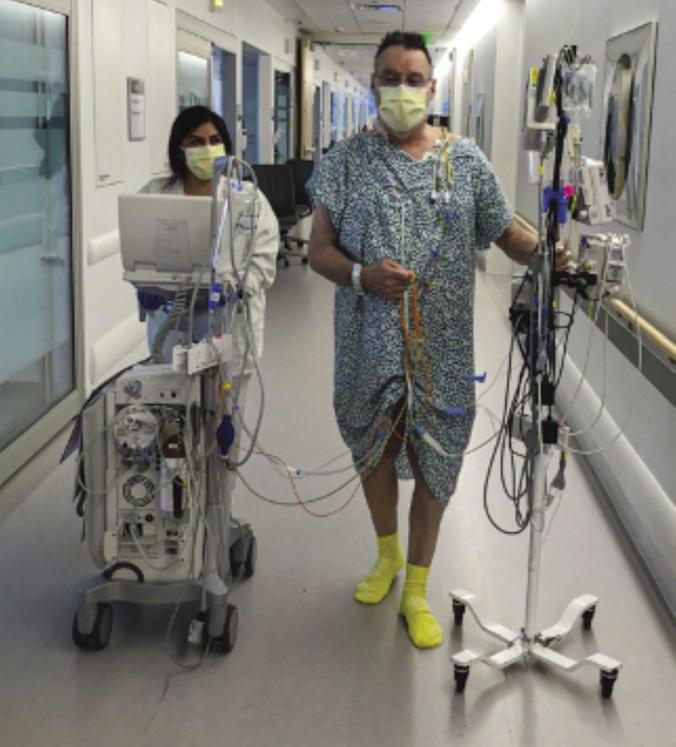
8 minute read
Consolidating a Vital Service Line in the Midst of the Pandemic
Acute Mechanical Circulatory Support Program –Consolidating a Vital Service Line in the Midst of the Pandemic
By Nicolas Brozzi, MD, Jaime Hernandez-Montfort, MD, and Gaston Cudemus, MD
The year 2020 will be remembered for the profound challenges brought by COVID-19, which affected millions of people worldwide and resulted in more than 550,000 deaths in the United States alone.
While most people affected by COVID-19 developed mild forms of the disease, a proportionally small (5%) but numerically significant number of patients developed severe respiratory failure, leading to a surge of hospital admissions that stressed most health systems around the country. The most severely ill patients required mechanical ventilatory support and eventually an extracorporeal membrane oxygenator (ECMO).
The first patient with COVID-19 to be admitted to the Cleveland Clinic Florida Weston campus came in mid-March 2020. The 62-year-old patient had recently traveled to England and had been admitted to a nearby hospital with progressive shortness of breath, and confirmation of COVID-19. He presented rapid clinical decline over 48 hours, progressing to the most severe form of respiratory failure, not responding to conventional mechanical ventilatory support or attempts at an increasingly adopted strategy of prone mechanical ventilation. The Acute Mechanical Circulatory Support (AMCS) team at Cleveland Clinic Florida was consulted and deployed to implement ECMO support on-site and transfered the patient to our Weston campus for further care.
The admission of this patient with the most critical form of lung failure required a strong collaboration among disciplines for a coordinated treatment that resulted in completely satisfactory clinical recovery. The patient was weaned off ECMO support after three weeks, weaned off a mechanical ventilator after 25 days, and discharged home 10 days later. This pioneering experience with mobile ECMO on COVID-19 patients was published in the Journal of Cardiac Surgery and encouraged the adoption of the concept of providing mobile ECMO for patients with COVID-19 around the globe, giving many critically ill patients one more fighting chance for recovery.
The rapid surge of cases sparked a deep interest in collaboration among multiple specialties to facilitate the care of these patients within hospital systems and across institutions. Communication among caregivers within different locations in the Cleveland Clinic Florida region was enhanced, and critical patients were discussed consistently among multidisciplinary teams. Recurrent virtual educational events were held during early phases of the pandemic as we strived to better understand COVID-19 and the role of potential therapies.

Cleveland Clinic Florida was one of the first centers to offer mobile ECMO. Here it is used to help transport a patient with severe acute respiratory distress syndrome due to COVID-19.
Situational Awareness Model of Care
Cleveland Clinic Florida • Severe COVID-19 Working Group
PERCEPTION
One Clinic: #Team of Teams
COMPREHENSION FUTURE PROJECTIONS
State of Environment:
Pandemic

Leadership Representatives
Attending Physicians/ Consultants
Hospital Administrators
Situation Awareness:
Severe C19 Meeting
Decision Making:
ECMO C19 Meeting
EXPONENTIAL Performance of Actions:
Quality/Safety Outcomes
RESEARCH EDUCATION INNOVATION
At a state level, we participated in the development of the Florida ECMO Consortium to facilitate communication and share resources and experiences among mechanical circulatory support programs providing ECMO support for patients with COVID-19 in Florida.
Situational Awareness Model of Care during the first wave of the pandemic
The Situational Awareness Model of Care for Severe COVID-19 initiative (SA MOC C19) was developed by members of the Cleveland Clinic Florida Heart, Vascular and Thoracic Institute Acute Mechanical Circulatory Support Program (HVTI AMCS) during the first wave of the pandemic (early April to late July of 2020), with the goal of providing interdisciplinary, timely and patientcentered evaluation and management for severe cardiopulmonary failure. SA MOC C19 initiative followed a structured multidisciplinary evaluation of patients admitted to the intensive care unit with suspected or confirmed COVID-19. Despite the multiple challenges of this unprecedented epidemic, severe COVID-19 is an opportunity for interdisciplinary teams to present their perspectives in a patient-centered fashion and reapply such models to other time-sensitive illnesses such as cardiogenic shock.
SA MOC C19 initiative developed several multidisciplinary educational activities via a virtual educational platform with the goal of improving multidisciplinary perceptions of a new disease entity. This followed a simplified structure of scheduled biweekly and ad hoc video conference calls inclusive of leadership representatives and attending physicians/consultants from multiple disciplines of care including critical care, hospital medicine, emergency medicine, palliative care, bioethics, infectious disease, anesthesiology, cardiology, cardiothoracic surgery, and acute mechanical circulatory support in addition to a hospital administrator for moderating. The electronic medical record was shared with emphasis on critical care detailed flow-sheets, imaging with access to patients’ real-time rhythm and hemodynamic monitoring. Review of the patients with possible or confirmed COVID-19 cases admitted to the C19 unit as well as those with potential for deterioration helped us provide a multidisciplinary comprehensive assessment of a novel entity. The review of cases was performed in a structured fashion describing severity of disease to facilitate objective interdisciplinary team discussion, including palliative care and bioethics. In every discussion, our enterprise’s goals and mission toward patient-centered care were maintained while assessing the demand for staffing redistribution, personal protection equipment, and availability of mechanical ventilation and ECMO circuits enhancing multidisciplinary future projections based on available predictive models and utilization dashboards.

Integration of AMCS Program across the Cleveland Clinic Florida region: Caregivers from Cleveland Clinic Martin North Hospital transferred a patient on ECMO support for further care at the Weston campus.
Enterprise collaboration, academic and scientific participation
Members of our team participated in the development of enterprisewide guidelines for the indication of ECMO support in patients affected by COVID-19, the protocols to implement it, the protection of the team of caregivers involved in the process, and the participation in multiple institutional and international clinical trials and registries to better understand the nature of the disease and the value of potential therapies.
Some of the most important registries include Extracorporeal Life Support Organization (ELSO), which has registered ECMO activities around the globe for 30 years; the prospective registry of the Cardiogenic Shock Working Group seeking to establish longitudinal follow-up of patients receiving AMCS; and the ECMOCARD study, which is the most comprehensive global registry of critically ill patients admitted to intensive care units at 400 collaborating centers from 55 countries.
Additional international collaborative initiatives include our participation in the International Consortium of COVID-19 ECMO, in which collective experience from around the world is being discussed in a virtual forum on a regular basis.
Early reports from COVID-19 registries have revealed that about half of the patients receiving ECMO support for COVID-19 acute respiratory distress syndrome are weaned from ECMO, and 35 to 40 percent of patients are discharged from the hospital either home or to rehabilitation centers. Our program supported eight patients with severe respiratory failure due to COVID-19 in 2020, admitting half of them from other regional hospitals, with similar results to those reported by international registries.
Consolidation of HVTI AMCS program in the year of the pandemic - regional collaboration
The commitment of our caregivers, along with strong support from our administration, has been critical to expanding the AMCS program in the midst of the pandemic. While many local hospitals faced challenges to provide intensive therapies for patients developing cardiogenic shock, our program was able to remain active providing a muchneeded service in our region. We were actually able to expand our services and provide support to 170 patients requiring intra-aortic balloon pump, and 60 patients requiring temporary transvalvular pumps (Impella), progressively adopting insertion of temporary devices in the axillary artery to facilitate rehabilitation of these patients.
The application of ECMO support also presented exponential growth during 2020, with 35 ECMO runs performed on 31 patients with cardiogenic shock or severe respiratory failure, including 11 patients who were transferred from other hospitals in South Florida for further clinical management and transition of support.
A SHOCK Line was established and continues today to provide consistent response to consults for mechanical circulatory support 24 hours a day, 7 days a week. By calling 954-48-SHOCK (74625) referring physicians receive immediate response from members of the AMCS team to evaluate the potential application of mechanical circulatory support in these patients. Calls are recorded to allow for concise follow-up.
Regional hospitals in South Florida have become aware of the rapid development of the AMCS program at Cleveland Clinic Florida, recognizing the value of such a dedicated team and our outcomes. This has resulted in an increasing number of referrals for AMCS, which is expected to continue to grow in the near future.
The growing experience and expertise of our team resulted in multiple presentations at virtual international meetings throughout Latin America.
Future directions
The milestones achieved by our AMCS program, with strong collaboration from the SICU team in 2020, represent the foundation to continue consolidating the program in the years to come.
Short-term goals include developing further education and training for caregivers, expanding on the “regionalization of care” concept by the adoption of common protocols within Cleveland Clinic Florida, closer collaboration with EMS teams, and consolidating the Hemodynamic Situational Awareness Model of Care. Close collaboration with emergency medicine, interventional cardiology, pulmonary medicine, and interventional radiology has been established to facilitate immediate response of patients presenting acute respiratory or cardiogenic shock related to a wide spectrum of pathologies including myocardial infarction, pulmonary embolism, and out-of-hospital cardiac arrest. Standardization of care pathways throughout the region should facilitate optimal care of the most critical patients with cardiovascular and respiratory failure.
Dr. Brozzi brozzin@ccf.org Dr. Hernandez-Montfort hernanj14@ccf.org Dr. Cudemus cudemug@ccf.org
REFERENCES For a complete list of references in this article, email garciac15@ccf.org.
Call 954.48.SHOCK (74625) for an immediate consultation for mechanical circulatory support 24 hours a day, 7 days a week.
Axillary artery access provides opportunity for patients to rehabilitate while awaiting heart transplantation at Cleveland Clinic Florida.












